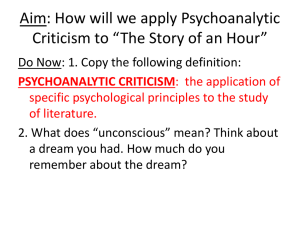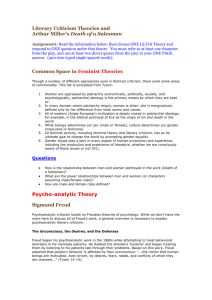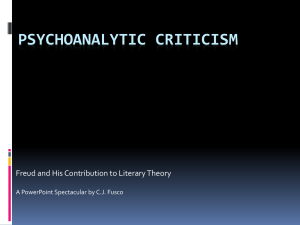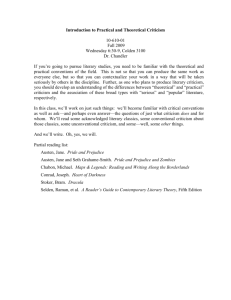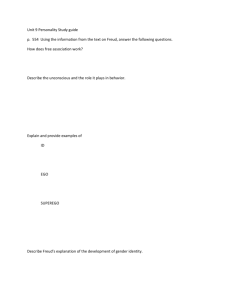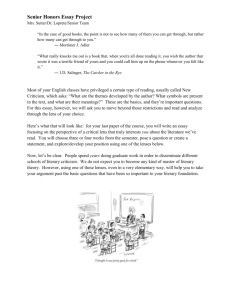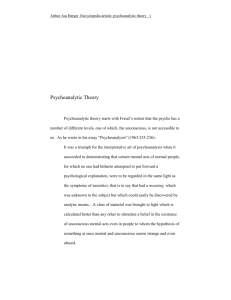Literary Theory and Schools of Criticism
advertisement
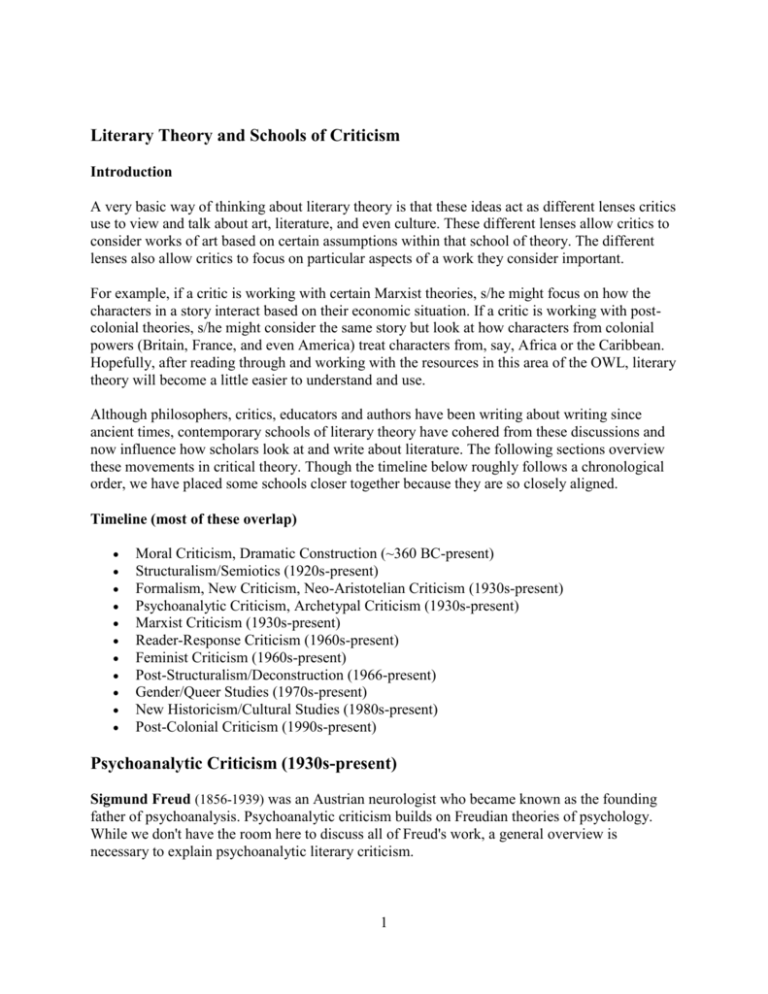
Literary Theory and Schools of Criticism Introduction A very basic way of thinking about literary theory is that these ideas act as different lenses critics use to view and talk about art, literature, and even culture. These different lenses allow critics to consider works of art based on certain assumptions within that school of theory. The different lenses also allow critics to focus on particular aspects of a work they consider important. For example, if a critic is working with certain Marxist theories, s/he might focus on how the characters in a story interact based on their economic situation. If a critic is working with postcolonial theories, s/he might consider the same story but look at how characters from colonial powers (Britain, France, and even America) treat characters from, say, Africa or the Caribbean. Hopefully, after reading through and working with the resources in this area of the OWL, literary theory will become a little easier to understand and use. Although philosophers, critics, educators and authors have been writing about writing since ancient times, contemporary schools of literary theory have cohered from these discussions and now influence how scholars look at and write about literature. The following sections overview these movements in critical theory. Though the timeline below roughly follows a chronological order, we have placed some schools closer together because they are so closely aligned. Timeline (most of these overlap) Moral Criticism, Dramatic Construction (~360 BC-present) Structuralism/Semiotics (1920s-present) Formalism, New Criticism, Neo-Aristotelian Criticism (1930s-present) Psychoanalytic Criticism, Archetypal Criticism (1930s-present) Marxist Criticism (1930s-present) Reader-Response Criticism (1960s-present) Feminist Criticism (1960s-present) Post-Structuralism/Deconstruction (1966-present) Gender/Queer Studies (1970s-present) New Historicism/Cultural Studies (1980s-present) Post-Colonial Criticism (1990s-present) Psychoanalytic Criticism (1930s-present) Sigmund Freud (1856-1939) was an Austrian neurologist who became known as the founding father of psychoanalysis. Psychoanalytic criticism builds on Freudian theories of psychology. While we don't have the room here to discuss all of Freud's work, a general overview is necessary to explain psychoanalytic literary criticism. 1 The Unconscious, the Desires, and the Defenses Freud began his psychoanalytic work in the 1880s while attempting to treat behavioral disorders in his Viennese patients. He dubbed the disorders 'hysteria' and began treating them by listening to his patients talk through their problems. Based on this work, Freud asserted that people's behavior is affected by their unconscious: "...the notion that human beings are motivated, even driven, by desires, fears, needs, and conflicts of which they are unaware..." (Tyson 14-15). Freud believed that our unconscious was influenced by childhood events. Freud organized these events into developmental stages involving relationships with parents and drives of desire and pleasure where children focus "...on different parts of the body...starting with the mouth...shifting to the oral, anal, and phallic phases..." (Richter 1015). These stages reflect base levels of desire, but they also involve fear of loss (loss of genitals, loss of affection from parents, loss of life) and repression: "...the expunging from consciousness of these unhappy psychological events" (Tyson 15). Tyson reminds us, however, that "...repression doesn't eliminate our painful experiences and emotions...we unconsciously behave in ways that will allow us to 'play out'...our conflicted feelings about the painful experiences and emotions we repress" (15). To keep all of this conflict buried in our unconscious, Freud argued that we develop defenses: selective perception, selective memory, denial, displacement, projection, regression, fear of intimacy, and fear of death, among others. Id, Ego, and Superego Freud maintained that our desires and our unconscious conflicts give rise to three areas of the mind that wrestle for dominance as we grow from infancy, to childhood, to adulthood: id - "...the location of the drives" or libido ego - "...one of the major defenses against the power of the drives..." and home of the defenses listed above superego - the area of the unconscious that houses Judgment (of self and others) and "...which begins to form during childhood as a result of the Oedipus complex" (Richter 1015-1016) Oedipus Complex Freud believed that the Oedipus complex was "...one of the most powerfully determinative elements in the growth of the child" (Richter 1016). Essentially, the Oedipus complex involves children's need for their parents and the conflict that arises as children mature and realize they are not the absolute focus of their mother's attention: "the Oedipus complex begins in a late phase of infantile sexuality, between the child's third and sixth year, and it takes a different form in males than it does in females" (Richter 1016). 2 Freud argued that both boys and girls wish to possess their mothers, but as they grow older "...they begin to sense that their claim to exclusive attention is thwarted by the mother's attention to the father..." (1016). Children, Freud maintained, connect this conflict of attention to the intimate relations between mother and father, relations from which the children are excluded. Freud believed that "the result is a murderous rage against the father...and a desire to possess the mother" (1016). Freud and Literature So what does all of this psychological business have to do with literature and the study of literature? Put simply, some critics believe that we can "...read psychoanalytically...to see which concepts are operating in the text in such a way as to enrich our understanding of the work and, if we plan to write a paper about it, to yield a meaningful, coherent psychoanalytic interpretation" (Tyson 29). Tyson provides some insightful and applicable questions to help guide our understanding of psychoanalytic criticism. Typical questions: How do the operations of repression structure or inform the work? Are there any oedipal dynamics - or any other family dynamics - at work here? How can characters' behavior, narrative events, and/or images be explained in terms of psychoanalytic concepts of any kind (for example...fear or fascination with death, sexuality - which includes love and romance as well as sexual behavior - as a primary indicator of psychological identity or the operations of ego-id-superego)? What does the work suggest about the psychological being of its author? What might a given interpretation of a literary work suggest about the psychological motives of the reader? Are there prominent words in the piece that could have different or hidden meanings? Could there be a subconscious reason for the author using these "problem words"? Brizee, Allen, J. Case Tompkins. “Psychoanalytic Criticism.” Purdue Online Writing Lab. (June 3, 2013). URL: https://owl.english.purdue.edu/owl/resource/722/04/ (September 18, 2014). *If you are interested in learning about other critical lenses, please access the OWL site at https://owl.english.purdue.edu/owl/resource/722/04/. 3 Questions to the Reading: 1. In your own words, explain the role of the unconscious on human behavior, according to Freud. 2. List any terms that you find confusing or difficult to understand, so that we may clarify them in class. 3. Identify anything in the article that resonated with, surprised, or disconcerted you. 4
